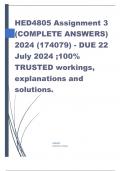HED4805 Assignment 3
(COMPLETE ANSWERS)
2024 (174079) - DUE 22
July 2024 ;100%
TRUSTED workings,
explanations and
solutions.
ADMIN
[COMPANY NAME]
, Question 1 (25) Read the given extract titled, “Colonialism, coloniality and
post-colonial Africa: a conceptual framework”, from chapter 7 of the
prescribed book (Seroto, Davids & Wolhuter 2020), and then answer the
questions that follow. Colonialism, coloniality and post-colonial Africa: a
conceptual framework Post-colonial reconstruction of African societies cannot
be limited to political and economic transformation. Due to the predominance
of Western epistemologies and systems of education during and after
colonialism, the African masses often became oblivious to their forgotten
history. Western European colonial policies such as ‘assimilation’ (French)
and ‘assimilados’ (Portuguese) were based on a rejection of the local culture
and an adoption of a foreign, European culture – essentially a denial of an
African identity. The African elite that worked in close collaboration with the
colonial administration often became the main protagonists of European
culture. When a few African leaders met in Addis Ababa in 1963 to establish
the Organisation of African Unity (OAU), the objective was to liberate the
continent from colonialism and apartheid. While apartheid was abolished in
1994, African countries remained largely dependent on foreign aid which
compromised their political and economic Assignment 03 History of Education
Due date: 22 July 2024 Unique assignment number: 174079 100 marks 24
independence. Without achieving its objectives, the OAU was dissolved in
July 2002 and transformed into the African Union (AU), which aimed to unite
its fifty-three member-states politically, socially and economically. The AU
intended to address the old African problems afresh through the promotion of
democracy, good governance and foreign investment (Carbone, 2002). For a
long time, Africa seems to have been suffering from the aftermath of
colonialism, which has posed serious challenges to its economic development
and independence. The colonial legacy left behind structural inequalities that
were difficult to eradicate. However, Smith argues that ‘there can be no social
justice without cognitive justice’ and calls for an ecology of knowledge(s) that
enables alternative ways of knowing and scientific knowledge to co-exist
(Smith, 2012:214). The inspiration of an African Renaissance, which is mainly
about cultural and intellectual revitalisation, should become an integral part of
transforming and reconstructing the socio-economic landscape of Africa.
Therefore, the restoration of Africa’s intellectual and cultural history needs to
be at the centre of political and economic reconstruction and should not be
treated in isolation. A common observation in previously colonised societies
during the post-colonial period is the patronising continuation of colonial myths
and stereotypes that represent the culture of the colonised as inferior




